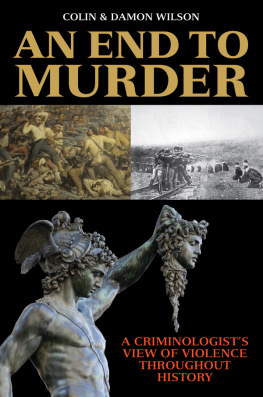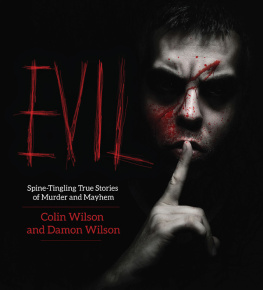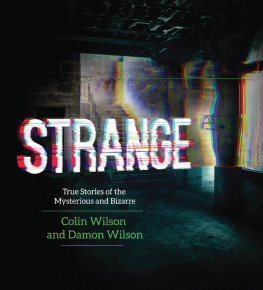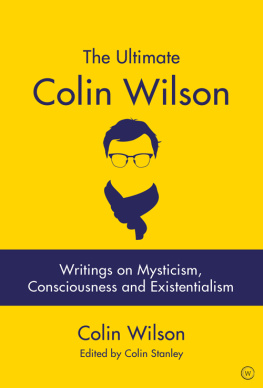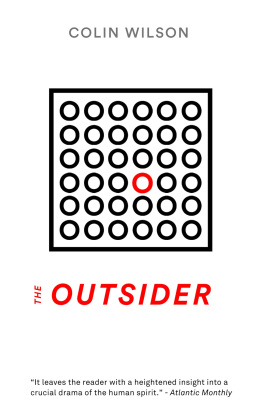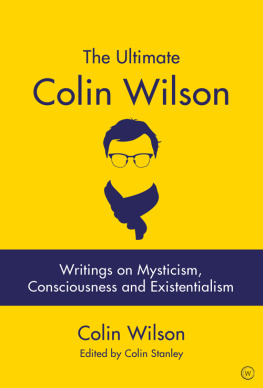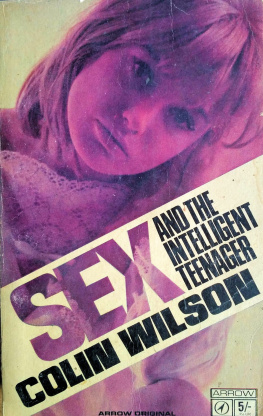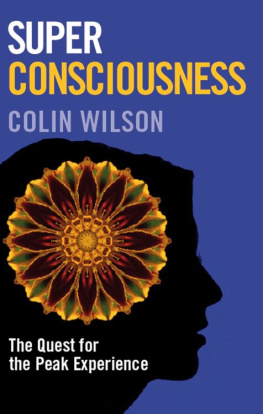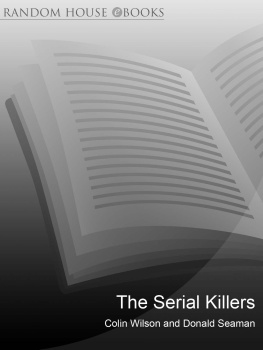Wilson Colin - An End to Murder
Here you can read online Wilson Colin - An End to Murder full text of the book (entire story) in english for free. Download pdf and epub, get meaning, cover and reviews about this ebook. year: 2015, publisher: Skyhorse Publishing, genre: Romance novel. Description of the work, (preface) as well as reviews are available. Best literature library LitArk.com created for fans of good reading and offers a wide selection of genres:
Romance novel
Science fiction
Adventure
Detective
Science
History
Home and family
Prose
Art
Politics
Computer
Non-fiction
Religion
Business
Children
Humor
Choose a favorite category and find really read worthwhile books. Enjoy immersion in the world of imagination, feel the emotions of the characters or learn something new for yourself, make an fascinating discovery.
- Book:An End to Murder
- Author:
- Publisher:Skyhorse Publishing
- Genre:
- Year:2015
- Rating:3 / 5
- Favourites:Add to favourites
- Your mark:
- 60
- 1
- 2
- 3
- 4
- 5
An End to Murder: summary, description and annotation
We offer to read an annotation, description, summary or preface (depends on what the author of the book "An End to Murder" wrote himself). If you haven't found the necessary information about the book — write in the comments, we will try to find it.
An End to Murder — read online for free the complete book (whole text) full work
Below is the text of the book, divided by pages. System saving the place of the last page read, allows you to conveniently read the book "An End to Murder" online for free, without having to search again every time where you left off. Put a bookmark, and you can go to the page where you finished reading at any time.
Font size:
Interval:
Bookmark:
COLIN WILSON, renowned criminologist, and TV and radio personality, was one of the most popular and respected writers on both criminology and psychology. He was the best-selling author of over sixty books, including The Outsider, The Criminal History of Mankind, A Plague of Murder, The Mammoth Book of True Crime and many other works of non-fiction and fiction.
DAMON WILSON is the author of a number of books including The Crime Archives and The Mammoth Book of Prophecies . He is the co-author, with Colin Wilson, of The Mammoth Book of the Supernatural .
Copyright Colin Wilson and Damon Wilson, 2015
First published in Great Britain in 2015 by Robinson
This North American edition first published in 2015 by Skyhorse Publishing
The moral right of the author has been asserted.
All rights reserved. No part of this book may be reproduced in any manner without the express written consent of the publisher, except in the case of brief excerpts in critical reviews or articles. All inquiries should be addressed to Skyhorse Publishing, 307 West 36th Street, 11th Floor, New York, NY 10018.
Skyhorse Publishing books may be purchased in bulk at special discounts for sales promotion, corporate gifts, fund-raising, or educational purposes. Special editions can also be created to specifications. For details, contact the Special Sales Department, Skyhorse Publishing, 307 West 36th Street, 11th Floor, New York, NY 10018 or HYPERLINK mailto:.
Skyhorse and Skyhorse Publishing are registered trademarks of Skyhorse Publishing, Inc., a Delaware corporation.
Visit our website at www.skyhorsepublishing.com.
10 9 8 7 6 5 4 3 2 1
Library of Congress Cataloging-in-Publication Data is available on file. Cover design by Brian Peterson
Print ISBN: 978-1-62914-812-0
Ebook ISBN: 978-1-63220-238-3
Printed and bound in Great Britain by CPI Makays

I find myself in an odd position. The death of my father and co-author, Colin Wilson, has left me having to dedicate this book containing his last original writing for both of us.
But I am quite certain who the dedication from Dad should go to, even though I never got the chance to discuss the matter with him. On behalf of my father, I would like to dedicate this book to Joy Wilson. My mother stood beside my father throughout his writing career, gave him children that he loved and cherished, filled his life with a quietly smug happiness, and was the first sounding-board for all of his ideas. Without my mother, Im sure Colin Wilson would have been a much less optimistic and a much less creative author.
For myself, I would like to dedicate this book to my own wife, Lucy. She is doggedly and long-sufferingly fulfilling the same role for me that my mother did for my father. It is my dearest wish that my much-loved wife will eventually tuck me into my grave, just as Mum did for Dad.
Damon Wilson, Friday 6 March 2015
Contents
A Beginning
There is something essentially wrong with the human race. And, ironically, it is in the light of our astonishing achievements that this wrongness is so clearly visible.
We are the dominant life form on the planet. Creatively and intellectually there is no other species that has ever come close to equalling us. Our ability to adapt to any environment is surpassed only by our ability to change any environment to meet our needs. Human society is dynamic, ever-evolving and tremendously multifaceted. Our humanitarianism empathises not only with the troubles of other people, but even with the suffering of competing species of animal. And the very fact that most, or perhaps all, of the above statements will have been questioned by the average reader could also be seen as evidence of the uniquely probing and Socratic nature of the human mind.
Yet, while no other species on Earth can hold a candle to human achievements, no other species is as suicidally prone to internecine conflict. Human history is a catalogue of coldhearted murders, mindless blood-feuds, appalling massacres and devastating wars. We are the only species on the planet whose ingrained habit of conflict constitutes the chief threat to our own survival: in Darwinian terms we are an enigma a species so successful that we threaten our own existence.
The question as to why our species is so exceptionally prone to violence is, of course, often asked; but usually rhetorically. The answers given are generally politically or religiously motivated, and are usually more reliant on unconsidered dogma than on scientific deduction.
For a politician the cause is always the failure of political opponents to deal with crime, and the solution is always to place more power into his or her hands. For the priest it is always failure to follow the commands of their god, as necessarily expressed through the priesthood. And for everyone, it seems, violence is never totally wrong: there are always expedients that allow for a violent solution. Terrorists who have to be killed, wars that have to be fought, children who need to be spanked none of us are free from at least the inclination to do violence to other human beings.
Its natural enough, on hearing such a statement, to think that that may be true of other people, but that you yourself hate all violence. Consider the following true story from the Second World War.
A young soldier was captured by the enemy. They discovered that he was an excellent pianist, so they sat him at a piano and told him to play. He was also told that the moment that he stopped playing, he would be taken outside and shot. The young man played continuously for over twenty-two hours, until his arms and fingers were in agony. Eventually he collapsed in tears, unable to play another note. His captors heartily congratulated him for such a Herculean effort. Then they took him outside and shot him.
Examine your emotional reaction at this moment. How much doy ou empathise with him? With his fear, pain, and his final despair when he realised that his captors laughter and slaps on the back did not mean that they were going to spare him. How do you feel about the men who tortured and murdered the young soldier? Can there ever be any justification for such heartless cruelty?
Now consider the following additional facts: the young man was a member of the Waffen SS the Nazi Partys elite shock troops, who ruthlessly carried out some of the worst atrocities of the war. The Russians who tortured and killed him had just fought their way across hundreds of miles of scorched earth, and knew of compatriots by the thousand non-combatant men, women and children who had been murdered by the retreating Nazis.
How much did your emotional reaction to the story just change? You would be a remarkable person if you found that your moral indignation had not reduced, if only by a fraction. You dont know that the young Nazi ever personally committed any crime, yet the fact that he died wearing the most hated uniform in modern history moved you at least a step closer to approving of his horrific murder.
This is a typical human trait: we almost automatically start to rationalise and justify any violence that happens to serve purposes of which we approve. On an instinctual level we act as if the ends justify the means; even if, intellectually, we reject that repugnant excuse. The ongoing mystery of unnecessary human violence is a classic case of not being able to see the wood for the trees: we tend to concentrate on individual crime cases the trees and fail to consider the vast forest of our apparently habitual brutality.
And yet, compared with any other period of human history, our generation is the most compassionate and non-violent that has ever walked the planet. Official report after official report, for almost twenty years, has clearly shown a steady downswing in violence, right across the globe. Certainly there are eruptions of brutality serial killers, crime waves and, of course, wars but these are brief reversals when compared to the general passivity that seems to be settling on the human race. And that recent trend is actually a continuation of gradual reduction of violence, both criminal and military, that has been taking place over the past three hundred years. The risk of you being stabbed by a thug, or killed by an invading army, is less now than it has been for any previous generation in history.
Next pageFont size:
Interval:
Bookmark:
Similar books «An End to Murder»
Look at similar books to An End to Murder. We have selected literature similar in name and meaning in the hope of providing readers with more options to find new, interesting, not yet read works.
Discussion, reviews of the book An End to Murder and just readers' own opinions. Leave your comments, write what you think about the work, its meaning or the main characters. Specify what exactly you liked and what you didn't like, and why you think so.

